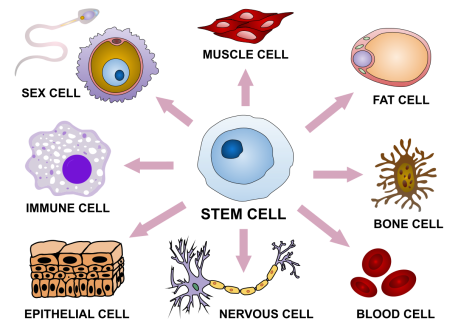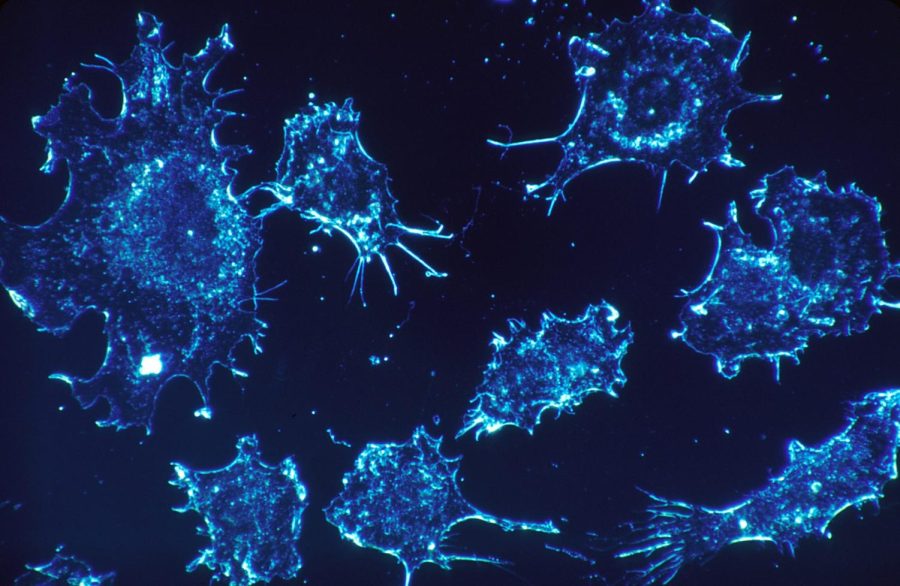Stem Cell Research: The Cure for Cancer?
April 21, 2023
For many years, science has prevailed against diseases and sickness, with new medications, vaccines, and technology being developed yearly. Treatments and cures have been devised for many ailments such as smallpox, rabies, measles, and malaria, which were deadly and hazardous during their time. However, to this day, cancer is a highly complex and challenging disease that science has yet to cure. Each year, millions of people worldwide are affected by cancer, and the search for a cure continues with little to no positive results.
Cancer is a disease in which cells undergo uncontrolled and unregulated mitosis or cell division. Typically, mitosis is a regular occurrence that is responsible for our growth and development. However uncontrolled mitosis from cancer causes tumors, or large cell masses, that can block normal cell function, destroy healthy tissue, and disrupt the immune system. Cancer can be caused by genetic or external environmental sources, causing a change in a person’s DNA and subsequently, their genes. Genes called proto-oncogenes regulate cell division and when they become mutated, they are called oncogenes. After mutations, they are switched permanently “on”, causing rapid cell division, even when not necessary.
Typical cancer treatments include surgery, therapy, chemotherapy, and radiation treatment. Surgery involves excising a tumor or tissue that contains cancer cells. Chemotherapy, on the other hand, is a drug treatment that uses chemicals and compounds to kill fast-growing cancer cells. Radiation treatment uses radioactive atoms that are aimed at a specific area and absorbed into the skin, stopping mitosis.
Although these treatments have significantly decreased mortality rates, there are several implications. For example, surgery-based cancer treatments are usually only effective for earlier cancer stages. In later cancer stages, once the cancer cells and tumors have spread throughout the body, surgery cannot completely get rid of cancer. In addition, surgery can have many unpleasant side effects, including bleeding, damage to other organs, and impaired recovery time. Regarding chemotherapy, a major disadvantage is that it can cause major damage to other organs. According to Hyunsoo Joshua No in a TedEd Lesson, “These medicines cause some level of harm to all cells in the body- even healthy ones”. Chemotherapy works by damaging rapidly dividing cells, which also explains why many cancer patients lose their hair because their hair follicles are damaged and stop growing.

However, a new idea for the treatment of cancer has gained popularity over the years: stem-cell research. Stem cells are essentially the body’s earliest cells; they are found in human embryos and are pluripotent, meaning they have the potential and ability to become almost any cell in the body. Stem cells have piqued major interest in researchers because they can essentially emulate healthy cells and act as regenerative medicines. Although stem cells don’t directly work against cancer, they can help your body recover by replacing cells that have been destroyed by cancer or chemotherapy/radiation therapy.
Although there is still a lot more to learn regarding stem cell research, it has already been used. The FDA has recently approved stem-cell therapy for specific cancers and bone-marrow transport, marking a major turning point. Blood stem cells that form into any blood type can help people restore blood cells that have been damaged by radiation or chemotherapy. This is crucial since blood donation supplies have been running low, however, with only about three percent of eligible people deciding to donate blood annually.
A major controversy surrounding stem-cell research involves ethical issues. Stem-cell research usually involves destroying human embryos, by extracting the inner cell mass of an embryo to obtain and manipulate the somatic cells. Some say that utilizing embryos for research purposes lessens the value of human life and can bring up other moral implications, acting as premature murder. However, scientists are working on other methods to make stem-cell research less controversial, including utilizing adult stem cells or finding genes that can emulate the potential of embryonic stem cells. Although there is much more research to be conducted in the field of stem-cell research, it holds big promise for the treatment of cancer and the development of regenerative medicines, which will influence humanity for the better.

















































































































































